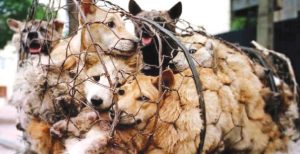 The great debate over what meat one should or should not be ideally eating has always been a contentious issue in the Indian society. First, there was a furore over eating beef which after a nationwide protest eventually led to a ban on selling and eating of bovine. Now, the nation’s outrage is directed to an entirely different kind of meat — the dog meat, which was a delicacy in Nagaland until 3 July this year.
The great debate over what meat one should or should not be ideally eating has always been a contentious issue in the Indian society. First, there was a furore over eating beef which after a nationwide protest eventually led to a ban on selling and eating of bovine. Now, the nation’s outrage is directed to an entirely different kind of meat — the dog meat, which was a delicacy in Nagaland until 3 July this year.
The Nagaland government has taken a decision to ban the commercial import, trading and sale of dogs and dog markets and dog meat whether cooked and uncooked. This decision has been hailed by not only the animal rights activists but welcomed largely by the dog lovers around the country.
Interestingly, Nagaland is the second state after Mizoram to take the step forward in giving away the age-old tradition of the selling and buying of dogs for mass consumption.
The ban unfolded when on 30 June, Indian politician, animal rights activist and People for Animals’ founder and chairperson Maneka Gandhi made a public appeal through a Twitter post to protest against the running of dog markets and dog meat restaurants in Nagaland, urging people to send emails to the Chief Secretary of the state, Temjen Toy.
“I want you to protest in a civilized manner to the Chief Secretary of Nagaland Mr Temjan Toy and ask for the police to stop the dog bazaars and the dog restaurants in Nagaland. The police should stop the dogs from coming in and the smugglers must be caught. This practice must stop…I want 50,000 emails to go to him,” Gandhi said in the letter.
An overwhelming 125,000 people responded with appeals to the Nagaland government. Along with the request letter, she posted a picture of dogs being tied by their mouths and feet and packed in gunny sacks, ready to be sold out in a wet market in Dimapur. The picture quickly stirred a widespread outrage on social media.
She said that such a practice should not be allowed to be carried out in the guise of culture and tradition. “This is illegal according to the laws of India and it cannot be allowed under the guise of culture,” Gandhi added.
Soon, many animal rights activists, defenders and dog-lovers, including meat lovers, joined the bandwagon protesting the age-old tradition along with Gandhi.
In no less than 72 hours of the social media outburst, Chief Secretary of Nagaland Temjen Toy was compelled to act with an announcement favouring the animal lovers. Subsequently on 3rd July, Toy announced on his twitter handle, “The State Government has decided to ban commercial import and trading of dogs and dog markets and also the sale of dog meat, both cooked and uncooked. Appreciate the wise decision taken by the State’s Cabinet.”
Nagaland reacts positively
On the ground, the people of Nagaland are evoking different opinions and sentiments on the decision. One section of the society welcomes the move, whereas, another section feels a decision made in haste after succumbing to political pressure has been enforced on them without proper planning and alternative livelihood options for the rural poor who were earning their living by selling dogs or dog meat.
Then there is another section of people — civil society groups, animal rights activists who call the decision a hypocrisy due to its selective outrage over dog meat, or beef for that matter, that lacks in overall empathy for the animals.
Tehelka reached out Noah’s Ark Nagaland, a popular online community for the pet lovers in the state. This is what they have to say on the debate of selective outrage over killing of animals.
“There has been so much debate regarding the recent ban of the commercial import of dogs within the Naga Community itself. We must first clarify the misconception that dog meat is prevalent all over the state as it is inaccurate and there are no dog meat festivals. Period. We must also respect the food habits of all citizens given the diversity of culture and traditions of the Naga people. However, due to the capturing of stray dogs from outside the state, most likely from Assam and West Bengal — meant to be transported to Nagaland, has led to the Nagaland Government banning the commercial sale of dog meat altogether,” says Noah’s Ark Nagaland.
Noah’s Ark Nagaland also pointed out the issue of ‘shoot-at-sight order’ for dogs found roaming on the streets. A decision that was taken by the local authorities in Nagaland in May this year.
“The unfortunate killing of owned-pets also known as shoot-at-sight order, which had been banned by the State Government yet continues to persist. We cannot ascertain exactly as to why such orders were given in certain areas of the state..but the most probable reasons were either fears of the spread of Covid-19 by dogs or for public sanitation, hygiene drive — a cause for which we have strived to bring awareness to prevent such regrettable incidents to occur in future.”
Another person, Jehnabi* from the capital town of Nagaland, expressing condemnation on the shoot-at-sight order’ for dogs said, “In Nagaland, when you are a pet owner — either of cats or dogs, we constantly have to live in fear that if we let them out without supervision, they will either be stolen to be eaten or shot (incase you live in areas where it is prohibited to let your dogs out of your compound). When you lovingly raise a pet as your family member and the thought of them being stolen to please someone’s appetite, it is quite horrifying.”
It is to be noted that Gandhi immediately retaliated with a sharp response on the killings of owned-pets with a letter addressed to the Nagaland Chief Minister Neiphiu Rio in May. “Shooting at sight and eating of dog meat both are illegal…The administration shouldn’t use this as an excuse to kill dogs that can be used commercially,” she said in the letter.
A local from Dimapur spoke with Tehelka on the account of anonymity. She fears backlash from the Naga Community if we reveal her identity as her beliefs are not in line with the majority of Naga people.
“If we (Naga pet owners) try to speak up against eating dog meat, we are bullied and categorised or called out as fake Nagas. There are many Nagas who don’t eat dog meat and who support this ban. However, those who eat criticised us and drew a connection with the mainland activists, saying it is the mainland Indian way of doing this to make us more like Hindus and stop our culture.”
She believes that it is time for the Naga community to give away such practices and evolve with time.
“People keep saying dog meat is part of our culture but we have abandoned so many practices from our culture since it hampers present day situations, so why not butchering of dogs as food? Eating dogs not only saddens dog owners here but also brings a bad reputation to our people from all around the globe,” she said
Chand Bardewa, a student of social work, Tata Institute of Social Sciences, Nagaland, says that one shouldn’t be surprised to see dogs in Naga households since most Naga people are actually dog lovers who love to own dogs — not for consumption but as pets.
“Eating dog meat in Nagaland is no longer a regular affair unlike old times. It was a different scenario in the ancient period when people would hunt down food for survival including dog meat. Since then Naga people have evolved completely. I don’t think the decision on banning dog meat has surprised us since we already knew that such a decision would come some day or other,” says Bardewa.
Bardewa says that the consumption of dog meat has surprisingly gone down in the past few years for the love of dogs as pets. It is not uncommon to see many households in Nagaland having dogs as pets. “ It is mostly the women from far-flung villages who would come to town to sell dogs or dog meat along with their local produce.”
Meyein Longchar, who is currently working from her native town Dimapur these days due to the Covid-19 lockdown says, “It is a welcome move as scientists grapple with identifying animal-to-human transmission of diseases, given that non-poultry consumption has never been institutionalised or regulated.”
The Federation of Indian Animal Protection Organisations (FIAPO), on 2nd July issued a press release that said, “Dogs are smuggled regularly to Nagaland from Assam and West Bengal. A dog, caught in Assam for 50, is sold for 1,000 in Nagaland’s wholesale market…Dog meat sells for 200 per kg on the streets of Nagaland, which is about 2,000 per dog.”
My eating habit, my choice
In an elaborate article to Scroll in 2017, noted anthropologist Dolly Kikon talked about the hypocrisy around the killing of stray dogs as pests by state authorities being somewhat acceptable, whereas, using the same animal for consumption is deemed ‘immoral’ for the society. Kiran writes,“So, on the one hand, you have stray dogs who are looked at as dangerous, posing serious concerns, and even labelled as encroachers in urban India. Yet, on the other hand, conversations about dog meat as a delightful meal are unthinkable. The subject of dog meat merges disgust and a grey area of legality. Thinking of dog meat as part of a food system, or linking it to larger issues of food culture or taste, does not cross the minds of many Indians. That is the reason why, although stray dogs are defined as pests and killed by state authorities every day, it is morally incomprehensible to label them as a food choice.”
Then Richard Kamei, a PhD candidate at Tata Institute of Social Sciences, Mumbai, wrote an opinion piece in EastMoJo (4th July) about how the ban has actually shown the Naga people in bad light — as ‘culturally uncivilised.’
Excerpts from the article,“It is a trap to make them feel bad for what they are and of their ancestors whose food culture had withstood the time in living gloriously and survival in the face of colonialism and post-colonial period. The food menu in mainstream societies has no space for indigenous food from Northeast and they are now dictating and having a final say on what not to eat, inadvertently trying to make them feel bad for their food practice. This is a classic case of cultural imperialism and racism in the name of showing love for animals. The inability to acknowledge and accept cultural difference is now new and has subjected thousands of them to racism.”
 Soon after the ban, many Nagas took over social media to express their disappointment against the decision of the government to ban dog meat. There are many people who have been eating dog meat since their forefathers’ time and enforcing a ban on their eating habit would only result in disharmony, says a youth.
Soon after the ban, many Nagas took over social media to express their disappointment against the decision of the government to ban dog meat. There are many people who have been eating dog meat since their forefathers’ time and enforcing a ban on their eating habit would only result in disharmony, says a youth.
Bullying against Nagas
Well, to talk about the dog-meat eating practice of the people of Nagaland. This is not the first time eating dog meat has come in the news. Many people from Nagaland living in Delhi or other states have always faced the ire through racial slurs for eating dog meat. “Do you eat dog meat?” Somewhat became the introductory question for mainlanders to ask people from north-east on the first meet. Slowly and quietly, when and how the dog meat tradition became a symbolic connotation to people from north-east nobody knew.
Sharing an incident with the correspondent, Leena* (29), who works as a consultant with a tech firm in New Delhi, narrated how she was subjected to racist bullying by one of her former colleagues who would comment on their dog meat eating culture. “Nagalog kutta khate hai na? Kaise kha lete ho? (Naga people eat dog meat, right? How can you eat dogs?” This is what I would be constantly asked on most days until one day I decided to raise the matter with the director. The racial bullying stopped after that.”
Nang Tanvi, a native of Arunachal Pradesh working in New Delhi says, “Looking at the current scenario where calling out a particular group, especially those who eat dog meat as dirty people or labelling them with racial slurs, hate speech is problematic and everyone should raise concern about this.”
“I am sensing that it is also making us as the north-east community insecure with such comments going on over the ban. It is assumed that all of us eat. Even if I don’t eat, I could say that no community should be profiled into such derogatory and hate speech of shaming and demeaning on cultural fronts. Now expecting large Indians to see cultural traits or respect it or even try to educate them is a battlefield of mind games and narrow mindsets,” says Tanvi.
Killing of dogs for meat is illegal under section 429 of the Indian Penal Code, 1860, and Section 11 of The Prevention of Cruelty to Animals Act, 1960. Even the Food Safety and Standard Regulations, 2011, does not allow dogs, cats and other animals to be slaughtered for food.
However, Article 371A of Nagaland provides special rights to the people of Nagaland, mainly the tribal community to practice and maintain their customary law and social practice. There are many Naga people who believe that the ban is a target and violation of their customary right which should have been discussed before enforcing on the people.
What’s next? – wonder the Nagas who have started to worry after the dog meat ban. As feared by a Naga local, many are concerned that the central government under pressure from the activists will impose more bans on other Naga food habits making its culture extinct and a thing of the past.
letters@tehelka.com











